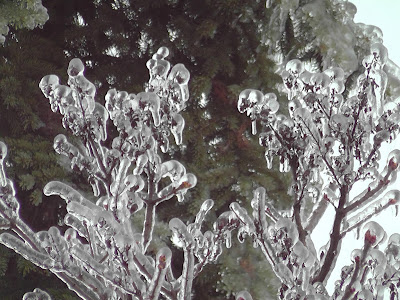|
|
| Glaze on a tree in Torronto |
Freezing rain is the name given to rain that
falls when surface temperatures below zero. Unlike snow, ice pellets (sometimes
called "mud"), or cold, freezing rain is completely liquid droplets.
Water droplets become supercooled while passing through a layer of sub-freezing
air several hundred feet above the surface, and then froze in a collision with
any object found. The resulting ice, called glaze, can accumulate to a
thickness of several centimeters.
Freezing rain is usually associated with a warm
front approaches, cold air, or at least the freezing temperature, and trapped
in the lower atmosphere as warm currents in the high. This occurs, for example,
when a low pressure system moved from the Mississippi Valley to the
Appalachians and the St. Lawrence River valley in North America during the cold
season, and there is a strong high pressure system sitting in the east. Hot off
the Gulf of Mexico and the air is often fuel for freezing precipitation.
 |
| Glaze on a tree in Torronto |
 |
| Glaze on a tree in Torronto |
Freezing rain develops as snow falls on a layer
of warm air, as a rule, the level of 800 mbar (800 hPa), the snow melts
completely and becomes rain. If a continuous rain fall, when passed through a
thin layer of cold air above the surface, and is cooled to a temperature below
0 (zero degrees Centigrade or 32 degrees Fahrenheit). However, they do not
freeze waterfalls, a phenomenon called supercooling (or forming " supercooled
drops ") . When supercooled droplets hitting the ground and power lines, tree
branches and planes, or anything else less than 0 degrees Celsius (32 degrees Fahrenheit)
and freeze in place, and the formation of a thin layer of ice, and hence
freezing rain.
 |
| Glaze on Trees |
 |
| Glaze on a Twig |
 |
| Glaze on a Twig |
 |
| Mushroom Covered with Ice Rain |
The
freezing rain and extreme danger to the aircraft, as it leads to the rapid
formation of ice structure. Most of the helicopters and small planes lacked the
necessary equipment to fly in ice melt any intensity of rainfall, and heavy
freezing rain can overwhelm even the most complex systems in large aircraft
deicing. Ice can increase the weight of the aircraft, but tend to cause danger.
The main risk comes from the ice is changing the form of the personal. This will
reduce lift and increase drag. The three factors that increase the speed and
reduce the loss journey, which makes it very difficult to climb or even
maintain the level rise.
The
plane can more easily avoid freezing rain moving in a hot air - in most cases, this
requires the plane to land, and usually does safely and easily, even with a
moderate accumulation of structural ice. However, rain and freezing
temperatures accompanied by a reversal in the air, which means that the plane
actually climb to move in the air warmer - a dangerous and difficult task, even
with a small amount of ice accumulation.
 |
| Glazed Twig |
 |
| Glazed Twig |
 |
| Beautiful View of Glazed Trees |
 |
| Glazed Twig |












No comments:
Post a Comment